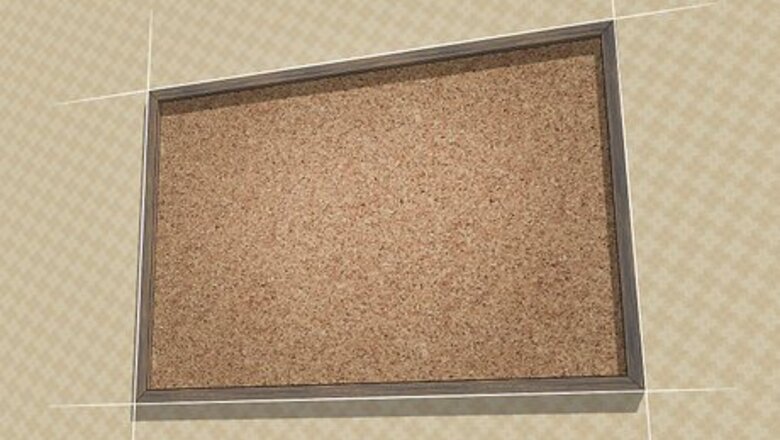
views
Adding Simple Decorations
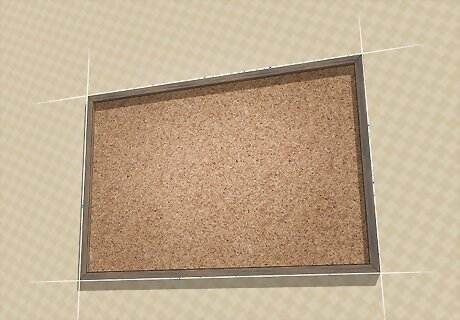
Take a blank bulletin board and hang it on an empty wall. Make sure that it is straight and won't fall down.
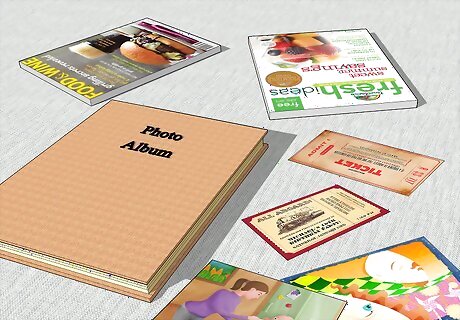
Look around your house for things you would like to have on your bulletin board. Special, personal items, such as photos, tickets, cards, and other flat memorabilia work very well. You can look through magazines and cut-out anything that strikes your fancy as well.
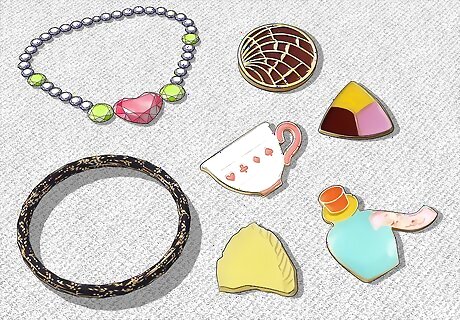
Don't be afraid to hang up some small trinkets, such as key chains. You can hang up some 3-D objects, as long as they aren't too heavy. Pin them to the board using a thumb tack or pushpin. Here are some ideas of small 3-D objects that you can hang up: Key chains Necklaces and bracelets Pendants Pins

Arrange your photos and other media. You make a collage by layering and overlapping your items. You can also arrange everything in a grid-like pattern with no overlapping.
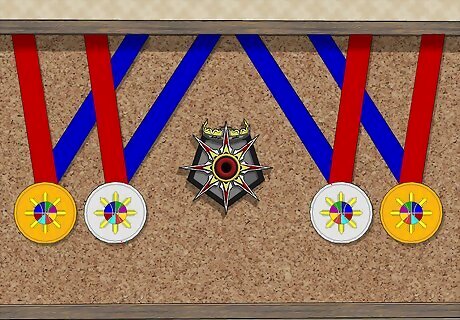
Consider putting up some personal items that mean a lot to you or that you are proud of. This is a great way to make your board even more unique. Here are some ideas of what you can pin up: 1st place science fair medals Award winning essays Personal artwork Postcards, birthday cards, or other holiday cards Tickets to concerts and movies
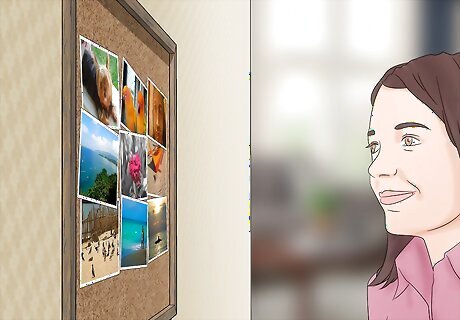
Make sure that you won't mind other people seeing what you put up on your board. There is a good chance that a parent, sibling, or friend might see your board. If you have something very personal, you might want to leave it off and keep it some place safe so that it doesn't get lost or ruined.
Customizing Your Board
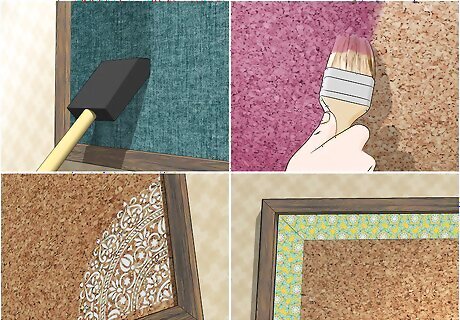
Consider customizing your board. Most bulletin boards are plain. They consist of a simple wooden frame with an even simpler cork board. Your board does not have to be so simple. You can paint it or cover it with fabric to make it even more special.https://www.wikihow.com/Decorate-a-Bulletin-Board This section will give you some customization ideas. You do not have to use all of the ideas in this section. Choose one or two that appeal the most to you.
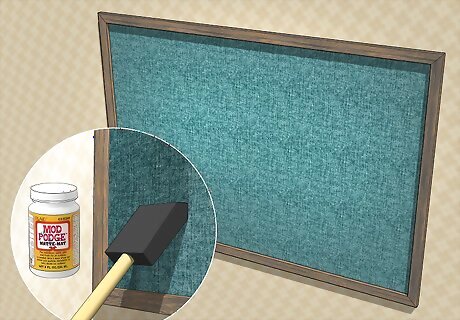
Give your board a fresh look by covering the cork part with fabric. Measure the height and length of the cork part. Do not include the frame in your measurement. Cut a piece of fabric according to your measurement. Cover the entire cork part with Mod Podge using a paintbrush or foam brush. Press the fabric down onto the Mod Podge and smooth out any wrinkles. Let the Mod Podge dry before you use your board. You can also glue your fabric down using spray adhesive. Cover the frame with painter's tape first, then spray both the fabric and the cork part with glue. Press the fabric down onto the board and smooth out any wrinkles. Remove the tape. You can also use printed paper or washi tape for this. Keep in mind that any holes you make in the paper using pushpins or thumbtacks, they will stay.
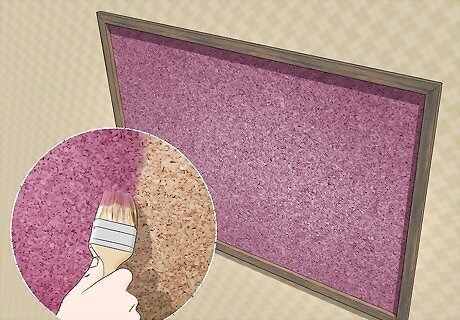
Make your board more colorful by painting the cork part. Cover the frame part with painter's tape. Next, paint the entire cork part using acrylic paint or spray paint. Remove the tape, then wait for the paint to dry. Depending on the brand you used, this may take anywhere from 20 minutes to two hours. You may need several coats of paint to get the texture and color you want. Wait each coat to dry before applying a new one. Use a foam brush or paintbrush to apply the acrylic paint. If your board is very large, use a foam paint roller instead. You can also use chalkboard paint. Paint your board with a paint primer first, then apply two to three coats of chalkboard paint. Once the paint dries, cover the entire board with chalk, then wipe the chalk off. This is known as "priming."
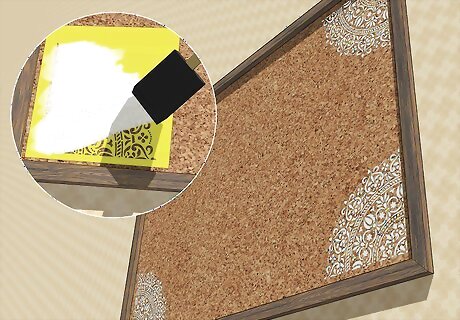
Stencil your board. Place a stencil down where you'd like your design. Use a foam brush or a stencil brush to tap some acrylic paint over the stencil. Carefully remove the stencil before the paint dries. Allow the paint to dry (at least 20 minutes for most brands) before you put anything on it. If the stencil moves too much, tape down the edges with painter's tape. Consider painting the cork part a solid color first. Wait for the paint to dry, then stencil designs over it using a contrasting color.
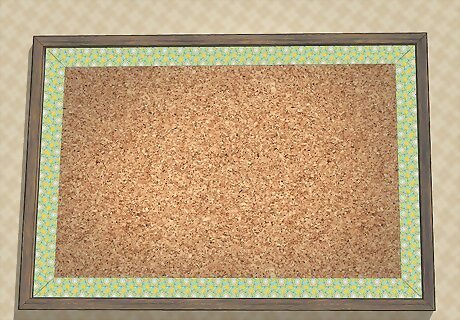
Add a border around the cork part, just inside the frame. Cut four pieces of ribbon: two for the height, and two for the length. Glue the ribbon down onto the cork part, just inside the frame, using fabric glue. Allow the glue to dry before you use the board. You can also use washi tape or any other patterned scrapbooking tape. You can buy them in the scrapbooking section of an arts and crafts store. Make sure the width of the tape will match the border of your pin board.
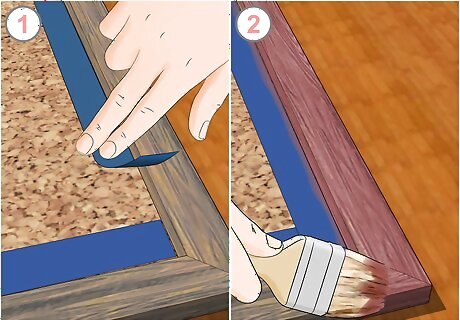
Paint the frame. Place painter's tape on the inside edges of the bulletin board, so that the frame is still showing but the cork part is partly covered. Paint the frame using acrylic paint and a paintbrush or foam brush. Remove the tape before the paint dries. Let the paint dry before you use the board. This can take anywhere between 20 minutes to two hours, depending on the brand you used.
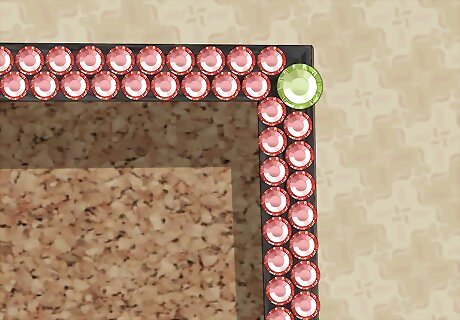
Decorate the frame. Sometimes, even painted frames look a little bland. You can fix this by adding some texture. Here are some ideas on what you can do to make the frame part look more interesting: Cut a strip from each tape, making sure each one matches the length of one side of your pin board. Place washi tape or any other patterned tape over the frame. Glue ribbon over the frame using fabric glue. Tape the sides first and then the top and bottom. Get a ruler and smooth over the tape. On the inner edge of the board and tape, use the edge of the ruler to push the edges of the tape down evenly. Use hot glue, super glue, or tacky glue to attach rhinestones or buttons to the frame. Cover the frame with some Mod Podge, then shake glitter onto it. Cover the frame again using glossy Mod Podge to seal the glitter in.
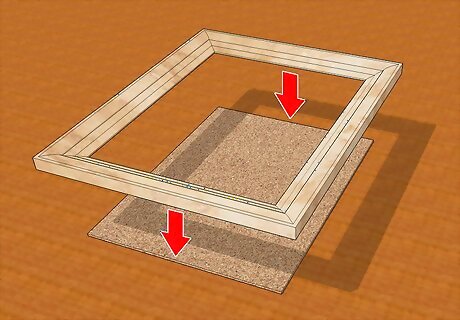
Make your own bulletin board using a corkboard and a fancy frame. Buy a large sheet of cork from an arts and crafts store. Next, buy a frame that fits the cork. Take the glass and backing out of the frame. Draw a line of glue inside the frame, then press the corkboard down into it.
Decorating a Classroom Bulletin Board
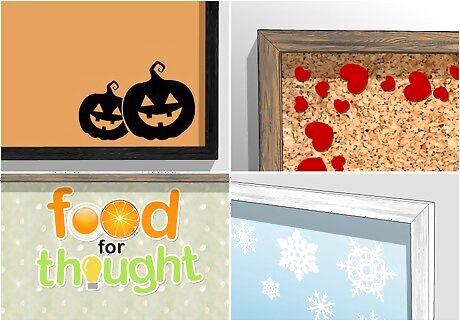
Create a custom board. This section will give you a few tips on how you can decorate your classroom bulletin board. You do not have to use all of the ideas in this section. Choose a few that appeal the most to you. You can buy most of the supplies in a teacher supply store. Some well-stocked art stores may also carry these supplies.
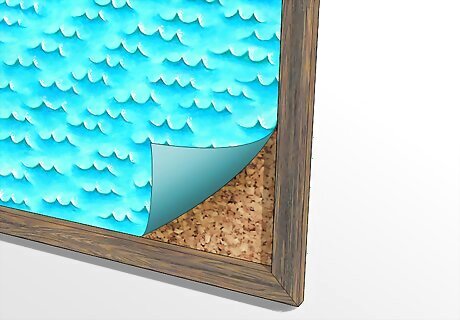
Use a background. Most classroom bulletin boards use solid-colored butcher paper. This hides the corkboard and make it look more colorful. You can be more creative and use wrapping paper or colorful fabric instead. Wrapping paper is great because it adds a lot of texture and pattern. You might want to use a solid-colored background and letters, as well as large, simple shapes, when decorating it. This will keep the designs from clashing. Fabric is great because pins and staples won't leave holes in it. It also won't fade, rip, or tear. If it wrinkles, all you have to do is iron it out.
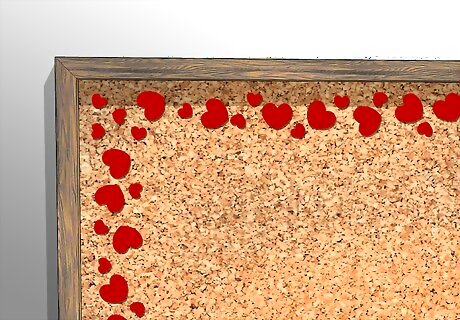
Get creative with borders. Most borders will be either solid-colored or patterned (and usually based off of a holiday, such as hearts for Valentine's day and shamrocks for St. Patrick's day). However, you can use almost anything you want for the border. Here are some ideas: Consider layering the border. Lay two to three pieces on top of each other. Each bottom piece should be sticking out from beneath the upper one by about 1 inch (2.54 centimeters). Use paper cutouts, such as hearts, snowflakes, leaves, or clover, to make your border. They should be smaller than your hand. Try to use different shades to add variety. For example, if you are using hearts, use red and pink paper. Use other items for borders, such as pompoms, playing cards, fake flowers, or even crumpled tissue paper.
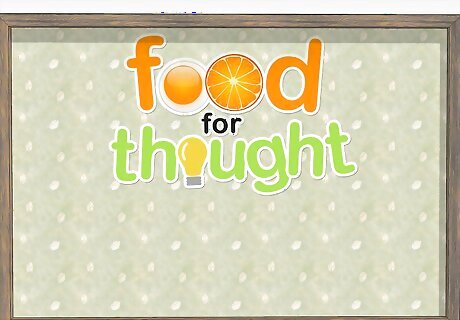
Play with the words. Most bulletin boards will use the same color and font for each word or phrase. You can make your board look more interesting by using different colors, sizes, and fonts for the letters. Here are some ideas to get you started: Use a different font for each word. Make one word bold and the other cursive or italic. Use a different color or pattern for each word. Make the words you want to emphasize larger. Make your own unique letters by tracing letters onto patterned scrapbook paper, and then cutting the letters out. Get a pennant banner (it looks like paper squares or rectangles attached to a long string) and write each letter on each pennant.
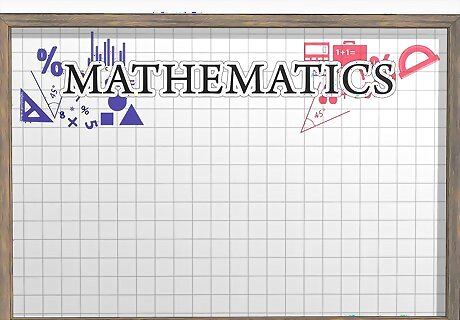
Base it off of something the students are currently studying. This is a great way to tie in what you are teaching at the moment to the rest of the classroom. Here are some ideas to get you started: If the class is learning about ancient Egypt, write the message on the board using hieroglyphics. You can use colored butcher paper to create a desert scene, including sand, palm trees, and pyramids. For an English classroom, you could make the bulletin board book or grammar related. If your students are studying a particular book, then base the bulletin board off of that book. Include the name of the book, as well as a phrase. You can even include a symbol or some characters from the book as well.
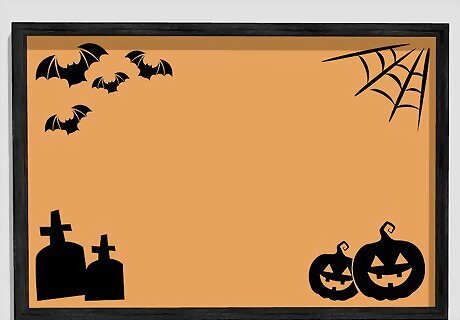
Base the decorations on your board off of a holiday. These sorts of decorations can stay up for the entire month that the holiday takes place in. They are a great way to make your classroom look more festive. Here are some ideas to get you started: For Valentine's day, use a soft pink or white for the background, and red for the borders and letters. Consider decorating the board with a Valentine's day craft project that the kids did. Leave the decorations up for all of February. For Halloween, use orange for the background, and black for the boards and letters. Decorate the board with black cats and bats. You can even add a cobweb and a spider to the corner. Leave the decorations up for all of October. For St. Patrick's day, green for the background, and white for the letters and board. Use colored butcher paper to create a rainbow and a pot of gold. Leave the decorations up for all of March.
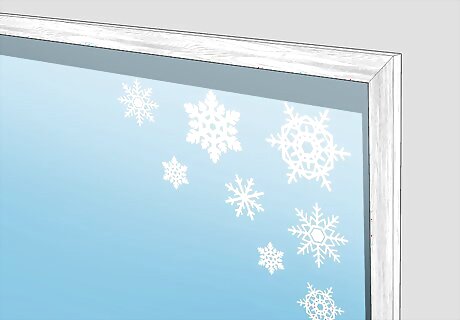
Base the colors and decorations on your board off of a season. Students have to spend a lot of their time indoors. This does not mean that they have to miss out on all that the seasons have to offer. You can decorate your board according to the season. Here are some ideas to get you started: Use lots of earth tones for fall. For example, use tan for the background and red or orange for the borders and letters. Staple paper pumpkins and red, orange, and yellow fall leaves to the board. Use lots of blue and white for winter. For example, use light blue for the background and white for the borders and letters. Create a snow scene using white butcher paper and lots of paper snowflakes. You can also use green butcher paper to create pine trees. Use bright colors for spring. For example, use light blue for the background and a cheerful yellow for the border and letters. Decorate the board using bright green paper for the grass, and pink, purple, and white paper for the flowers. Use tropical colors for summer. Use a light blue for the background and yellow for the border and letters. You can decorate the board with colorful hibiscus flowers, seashells, palm trees, and a sun.
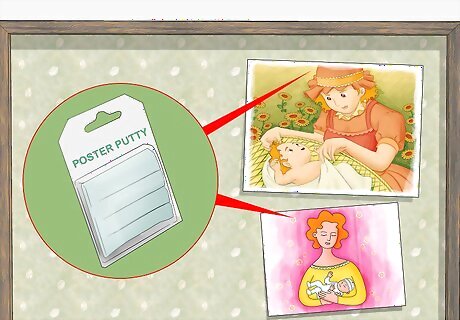
Hang the students' artwork on it. This is a great way to make your board look more colorful. It will also save you the trouble of having to buy supplies to decorate it with. Try not to staple the student's artwork to the board, as this can create holes and ruin it. Instead, try to use some poster putty instead. It comes off of paper easily. Most people use it to stick posters to walls. If you must staple the artwork, try staple only the top of the artwork. Do not get too close to the edge, however; the art piece by rip off, creating a tear in the student's artwork. This could end in lots of tears.

















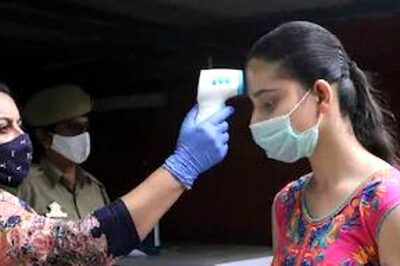


Comments
0 comment